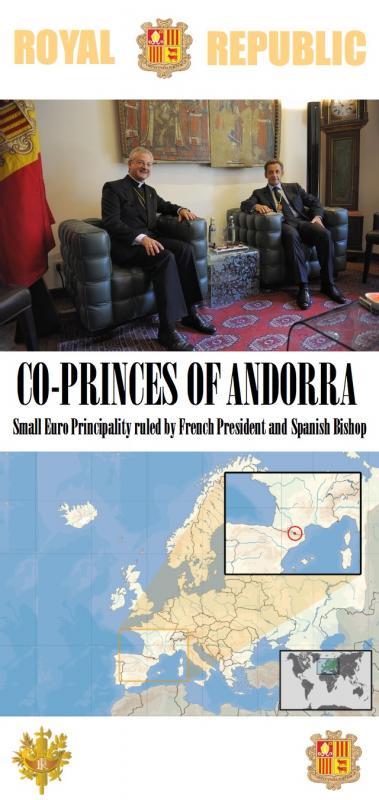
The Co-Princes of Andorra are the two rulers of the Principality of Andorra, a tiny landlocked nation lying in the Pyrenees mountains between France and Spain. (See List of Rulers since 1278 A.D)
(Source: persianrealm.com)
The current incumbent heads of state of Andorra are Archibishop Joan Enric Vives Sicília (since May 5th, 2009) and Nicolas Sarkozy (since 16 May 2007). A post the latter will either keep or relinquish to his successor pending the future results of the French Presidential élections.
Founded in 1278 through a treaty between the Spanish Bishop of Urgell and the French Count of Foix, this unique monarchial arrangement has persisted through medieval times to the present day. Currently, the Bishop of Urgell and the President of France serve as Andorra’s co-princes, following the transfer of the Count of Foix’s claims to the Crown of France, and thence to the French Republic.
The Andorran principality has the unique distinction of being ruled by two non-Andorran sovereigns, one of whom (the French president) is the only monarch in the world to be elected by the people—though not by the people of Andorra, but rather those of France. He is also the only monarch to be the head of state of a republic at the same time.
In 2009, French president Nicholas Sarkozy threatened to resign his title of Andorran co-prince if the principality did not change its banking laws to eliminate its longstanding status as a tax haven.
(More on the history of Andorra Here)
Rick Steve Report on Europe’s Little Principlaity of Andorra:
Just little more than a generation ago, Andorra morphed from a rough-and-tumble smugglers’ haven to a high tech, high altitude shoppers’ haven, with pockets of old-world charm hiding out in the town center. For more information on the Rick Steves’ Europe TV series — including episode descriptions, scripts, participating stations, travel information on destinations and more — visit www.ricksteves.com
Co-prince of Andorra invites the Pope to visit the country:
*****************************
*****************************
KNOW YOUR GEOGRAPHY ?
*****************************
*****************************
Newsroom : U.S. Shocked Andorra Not In Africa (Feb 19, 2008):
The United States gave billions of dollars in aid to the wealthy European principality of Andorra, which it mistakenly assumed was a poor African country.
*****************************
*****************************
MONARCHICAL REPUBLIC
*****************************
*****************************
Andorra National Anthem:
El Gran Carlemany, the national anthem of Andorra, both instrumental and vocal version
French National Anthem: La Marseiilaise:
The Constitution of Andorra carefully defines the exact role and prerogatives of the co-princes of Andorra today. The constitution establishes Andorra as a “parliamentary coprincipat”,[6] providing for the President of France and Bishop of Urgell to serve together as the joint heads of state.[7] The constitution distinguishes between which powers they may exercise on their own (Article 46), and which require the countersignature of the head of the Andorran government, or the approval of the Syndic General, the Andorran legislature (Article 45).
Powers the princes may exercise on their own include:
a) Joint exercise of the “prerogative of grace” (the power to pardon);
b) Each co-prince may appoint one member of the Superior Council of Justice and one member of the Constitutional Tribunal;
c) Establishment of such services as they deem necessary to fulfil their constitutional prerogatives, and appointment of individuals to fulfil these services;
d) Requesting a preliminary judgment about the constitutionality of proposed laws, or of international treaties;
e) Agreeing to the text of any international treaty, prior to submitting it for parliamentary approval;
f) Bringing a case before the Constitutional Tribunal in the event of any conflict over the exercise of their constitutional prerogatives.
Powers the princes may exercise in conjunction with the head of government include:
a) Calling for elections or referendums in accordance with constitutional provisions;
b) Appointing the head of government in accordance with constitutional provisions;
c) Dissolve the General Council (the Andorran legislature) prior to the expiration of its current term (but not until at least one year has passed since the prior election);
d) Accrediting diplomatic representatives from Andorra to foreign states, and receive credentials of foreign representatives to Andorra;
e) Appointing office-holders in accordance with appropriate constitutional provisions;
f) Sanctioning and enacting laws in accordance with constitutional provisions;
g) Granting formal consent to international treaties, once ratified by the General Council.
Certain treaties require the participation of the co-princes (or their designated representatives) in their negotiation process as well as their final approval; these are detailed in Articles 66 and 67 of the constitution.
The co-princes jointly retain the right to propose amendments to the constitution; this same right rests with the General Council. They have no veto power over legislation passed by the General Council, though they do retain a veto over certain international treaties, as described above.
Related Blogs:
EL CID: Spain’s King Knights Sarkozy with Order Of the Golden Fleece
MONARCHICAL REPUBLIC: Political Participation in Elizabethan England
ROYAL FORUM: Explaining the Concept of a Constitutional Monarchy to a Staunch Republican






